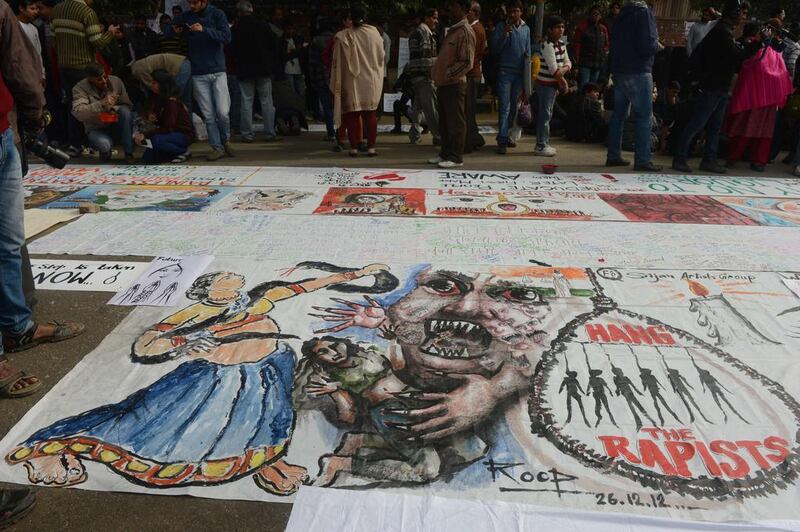MUMBAI //
As India debates how to halt a rising tide of violence against women, two filmmakers are tackling the subject head on with a Bollywood movie called “Kill the Rapist?”
The film was inspired by the fatal gang-rape of a student in the capital New Delhi late last year, which triggered widespread outrage and national soul-searching over the treatment of women in India.
The new film aims to make “every rapist shiver with fear before even thinking of rape”, according to its Facebook page, which has already notched up more than 40,000 supporters.
With a modest budget and a largely unknown cast, “Kill the Rapist?” is due for release in December, one year after the Delhi attack in which a gang of six savagely attacked a 23-year-old physiotherapy student and her male friend on a bus.
“The brutality of that crime shook me up. It reminded me that we are such a hypocritical and selfish society,” said Siddhartha Jain of iRock Films, who produced the movie.
“Through this film we want to amplify the debate on the issue and show that there is no one solution.”
The student died two weeks later from internal injuries inflicted during the attack, and four men were sentenced to death in September — a punishment aimed, in part, at deterring would-be sexual predators.
Despite the outpouring of anger over the incident which led to a tougher rape law, sex crimes across the country continue to be reported daily in the Indian media.
“Kill the Rapist?” looks at how a victim of such an attack might act out her own revenge.
“As a society, we don’t have much reverence or confidence in the legal system so if you happen to be the victim of a rape attack, what do you do?” said director Sanjay Chhel.
“Our film explores what the girl goes through physically, mentally, her journey and the people around her. We have put a question mark at the end of the title because we don’t want to preach or take a legal stand.”
While the filmmakers want the movie to shock and unsettle the audience, they say it is not meant to be sensational.
The rape itself is never shown and the plot revolves around three female flatmates, who each offer a different perspective on the options available when a rapist attacks one of them.
“At some point the hunter becomes the hunted. The story unfolds in a 12-hour time frame during which power shifts and the girls face dilemmas on how to deal with this rapist,” said Mr Jain, who funded the film with contributions from two female private equity investors.
Mr Jain also plans to set up an anti-rape foundation using some of the film’s profits, to spread awareness and raise funds for charities working on women’s issues.
Another Indian director inspired by the Delhi attack is Shahid Kazmi, whose film “Damini (Lightning) — The Victim” premiered in the northern city of Jammu this month. The title refers to the name given to the victim by the media, which cannot use her real name for legal reasons.
An upcoming Bengali film by director Milan Bhowmik, titled “Nirbhoya”, is also said to be based on the attack.
While these alternative films may be tackling the subject of sex crimes, commercial Indian movies have often been accused of objectifying women — itself a subject of heated debate since the Delhi gang-rape.
In the 1960s and 1970s, a typical Bollywood narrative often involved a woman rejecting the overtures of a male suitor, who then pursued her almost to the point of stalking until she finally relented.
In modern movies, song-and-dance routines known as “item numbers”, with scantily-clad women and titillating lyrics, have also come under fire. One playwright since the gang-rape has called Bollywood “a monster that has gone horribly wrong”.
But others in the industry have defended their films, saying Bollywood has become a soft target that cannot be blamed for inciting violence — especially as on-screen rapists are often brought to justice by the heroes.
The makers of “Kill The Rapist?” hope their film will show that movies can sometimes empower, as well as entertain.
“We usually make more youth-centric, fun films but I thought we must balance it with some responsibility and make a movie which is also positive, motivational and insightful,” said Mr Jain.
*Agence France-Presse





